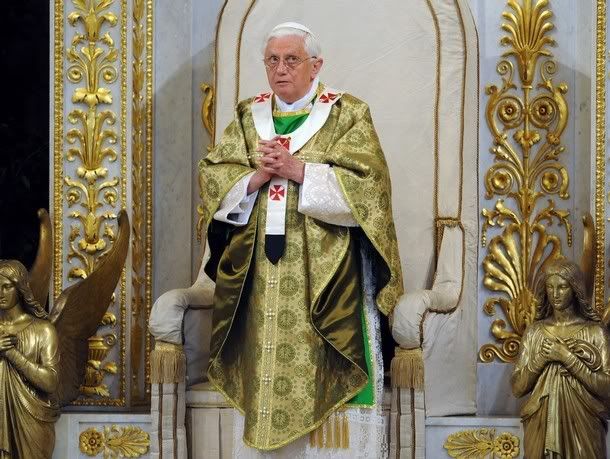 We had another great treat yesterday. Pope Benedict gave both aHomily and a Sunday Angelus. The Homily was for the Opening Mass for the 12th General Assembly of the Bishops' Synod . The Mass occurred at the wonderful Basilica of St. Paul outside the Walls . Thanks to the Ratzinger forum for the pics and the quick English translation.
We had another great treat yesterday. Pope Benedict gave both aHomily and a Sunday Angelus. The Homily was for the Opening Mass for the 12th General Assembly of the Bishops' Synod . The Mass occurred at the wonderful Basilica of St. Paul outside the Walls . Thanks to the Ratzinger forum for the pics and the quick English translation.
Sometime this week the official English translation at the Vatican will be put up here.
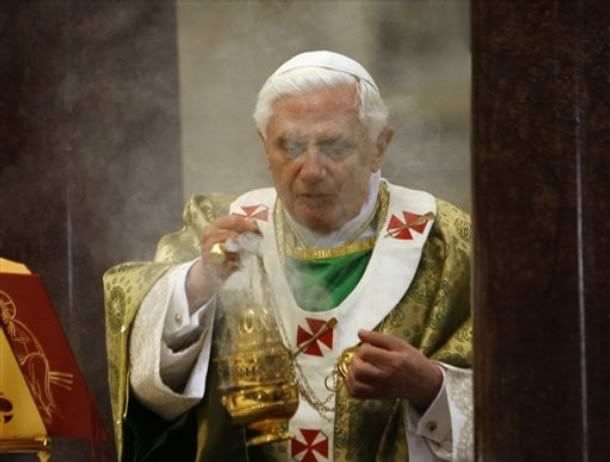 HOMILY ON 10/6/08 Opening Mass for the 12th General Assembly of the Bishops' Synod Basilica of St. Paul outside the Walls
HOMILY ON 10/6/08 Opening Mass for the 12th General Assembly of the Bishops' Synod Basilica of St. Paul outside the Walls
Here is a translation of the Holy Father's homily today: Venerated brothers in the Episcopate and Priesthood,
Dear brothers and sisters! The first Reading, taken from the book of the prophet Isaiah, as well as the Gospel passage taken from Matthew, propose to our liturgical gathering a suggestive allegorical image from Sacred Scripture: the image of the vineyard, which we also heard in preceding Sundays.
The initial passage in the Gospel narration refers to the 'canticle of the vineyard' that we find in Isaiah. It is a song set in the autumnal context of the grape harvest - a small masterpiece of Hebrew poetry which would have been quite familiar to those who listened to Jesus, and from which, as from the other citations of the prophet (cfr Os 10,1; Ger 2,21; Ez 17,3-0; 19,10-14; Sal 79,9–17), one understands well that the vine indicates Israel.
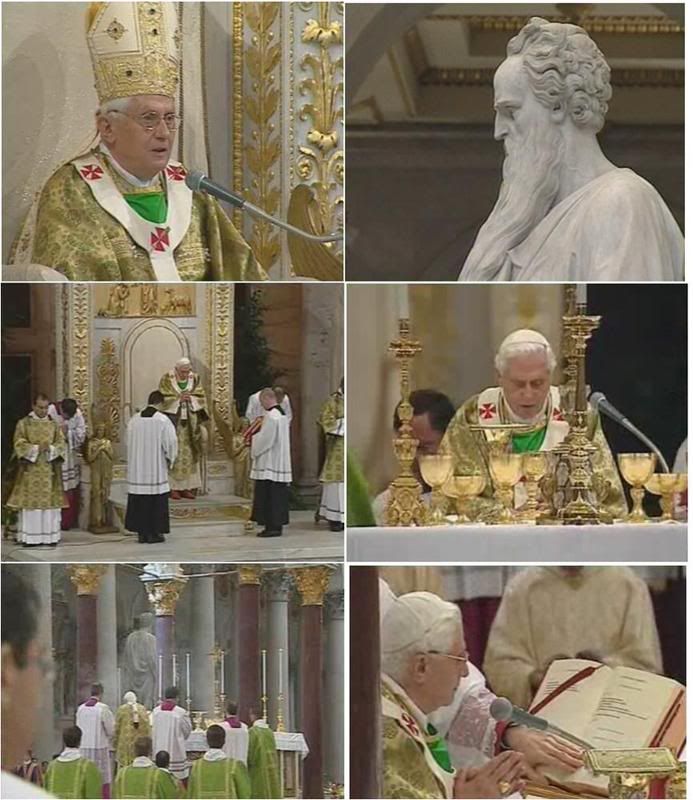 To this vineyard, the people he has chosen, God reserves the same concern and care that a faithful spouse shows for his wife (cfr Ez 16,1-14; Ef 5,25-33). The image of the vineyard, along with that of a wedding, thus describes the divine plan of salvation, and is a moving allegory of God's alliance with his people. In the Gospel, Jesus takes up the canticle of Isaiah but adapts it to his listeners and to the new hour in the history of salvation.
To this vineyard, the people he has chosen, God reserves the same concern and care that a faithful spouse shows for his wife (cfr Ez 16,1-14; Ef 5,25-33). The image of the vineyard, along with that of a wedding, thus describes the divine plan of salvation, and is a moving allegory of God's alliance with his people. In the Gospel, Jesus takes up the canticle of Isaiah but adapts it to his listeners and to the new hour in the history of salvation.
The accent is not so much on the vineyard but on the tenants of this vineyard, from whom the 'servants' of the master came to demand the produce in his name. But the servants were mistreated and even killed. How can we not think of the experiences of the Chosen People and the destiny reserved to the prophets sent by God?
In the end, the owner of the vineyard makes a last attempt: he sends his own son, convinced that the tenants would listen to him. But the opposite happens. The tenants kill him precisely because he is the son, the heir, convinced that in doing so, they could more easily take possession of the vineyard.
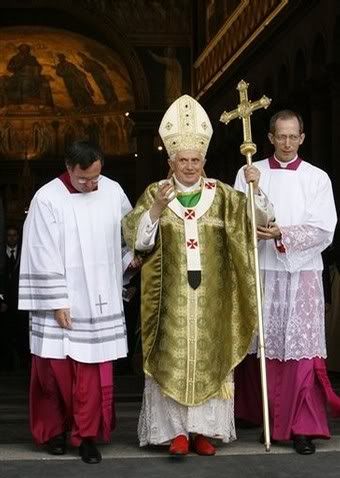 Thus we see (in this parable) a qualitative leap from the accusation of violating social justice that emerges in the canticle of Isaiah. Here we see clearly how contempt for the orders given by the master is transformed into contempt for him. It is not simple disobedience to a divine precept. It is true and proper rejection of God.
Thus we see (in this parable) a qualitative leap from the accusation of violating social justice that emerges in the canticle of Isaiah. Here we see clearly how contempt for the orders given by the master is transformed into contempt for him. It is not simple disobedience to a divine precept. It is true and proper rejection of God.
The mystery of the Cross comes to light. What the Gospel page denounces concerns our very own way of thinking and behaving. It does not speak only of Christ's 'hour', of the mystery of the Cross at that moment, but of the presence of the Cross at all times. It concerns especially the people who have received the news of the Gospel.
If we look at history, we are forced to observe not infrequently the coldness and the rebellion of inconsistent Christians. As a consequence, God, even if he will never take back his promise of salvation, often had to resort to punishment. One might think spontaneously, in this context, of the first announcement of the Gospel, which gave rise to Christian communities that flourished initially, but which then disappeared and are now remembered only in history books. Cannot the same thing happen in our time?
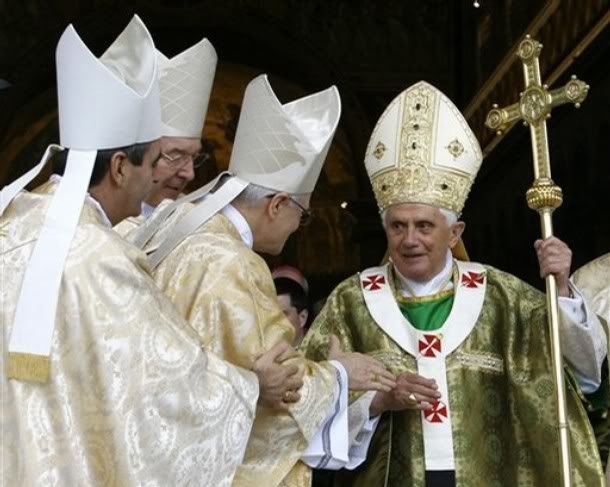
Nations which were once rich in faith and vocations are now losing their own identity under the deleterious and destructive influence of a certain culture of modernity. There are those who, having decided that 'God is dead', declare themselves to be 'god', considering themselves the only authors of their own destiny, absolute proprietors of the world. Ridding himself of God and not expecting salvation from him, man thinks he can do as he pleases and be himself the measure of his own behavior.
But when man eliminates God from his own horizon and declares God 'dead', is he truly happy? Does he really become more free? When men declare themselves absolute proprietors of themselves and the only masters of creation, can they really construct a society in which freedom, justice and peace can reign?
Does this not result rather - as the daily news demonstrates amply - in spreading the arbitrariness of power, selfish interests, injustice and exploitation, and violence in every form? The point of arrival, eventually, is that man finds himself more alone and society more divided and confused.
But there is a promise in the words of Jesus: the vineyard shall not be destroyed. Even as he leaves the unfaithful tenants to their destiny, the owner does not abandon his vineyard and entrusts it to other faithful servants. This indicates that even if in some places, faith has been weakened to the point of extinction, there will always be other peoples ready to welcome it. Precisely because of this, Jesus - while citing Psalm 117(118): "The stone that the workers had discarded has become the cornerstone" (. 22) - was giving assurances that his death would not be the defeat of God. He would not stay in the tomb; rather, that which would seem to be total defeat, would mark the start of a definitive victory.
His sorrowful passion and death on the Cross would be followed by the glory of Resurrection. The vineyard would continue to produce grapes and it would be leased by the owner "to other tenants who will give him the produce at the proper times" (Mt 21,41). The image of the vineyard, with its moral, doctrinal and spiritual implications, will come back in the discourse at the last Supper, when, bidding farewell to his Apostles, the Lord will say: "I am the true vine, and my Father is the vine grower. He takes away every branch in me that does not bear fruit, and everyone that does, he prunes so that it bears more fruit" (Jn 15,1-2).
With the Paschal event, the history of salvation will have a decisive turning point, and its protagonists will be those 'other tenants' who, grafted as chosen seedlings in Christ, the true vine, will bear abundant fruits of eternal life (cfr Collect prayer). We are among such 'tenants', grafted to Christ, who is himself the true vine. Let us pray that the Lord who gives us his own blood, his very self, in the Eucharist, may help us to 'bear fruit' for eternal life and for our own time.
The comforting message which we take from these Biblical texts is the certainty that evil and death do not have the last word, but that Christ wins in the end. Always!
The Church does not tire of proclaiming this Good News, as it does even today, in this Basilica dedicated to the Apostle of the Gentiles, who was the first to spread the Gospel in vast regions of Asia Minor and Europe. We wil be renewing this proclamation in a significant way during the 12th ordinary General Assembly of the Synod of Bishops, whose theme is "The Word of God in the life and mission of the Church".
I wish to greet all of you, venerated Synodal Fathers, with heartfelt affection, and all those who are taking part in this encounter as experts, auditors and special guests. I am equally happy to welcome the fraternal delegates from other Churches and ecclesial communities. To the Secretary General of the Synod of Bishops and his co-workers, I express my acknowledgment for the demanding work they have carried out in these past months, as well as my best wishes for the efforts that await them in the coming weeks.
When God speaks, he always asks for an answer. His action of salvation requires human cooperation. His love expects correspondence. Dear brothers and sisters, may it never happen what the Biblical text says about the vineyard: "He looked for the crop of grapes, but what it yielded was wild grapes" (cfr Is 5,2). Only the Word of God can profoundly change the heart of man, and so it is important that individual believers and communities enter into ever growing intimacy with it, The Synodal assembly will turn its attention to this fundamental truth for the life and mission of the Church.
To nourish ourselves with the Word of God is a primary and fundamental task.
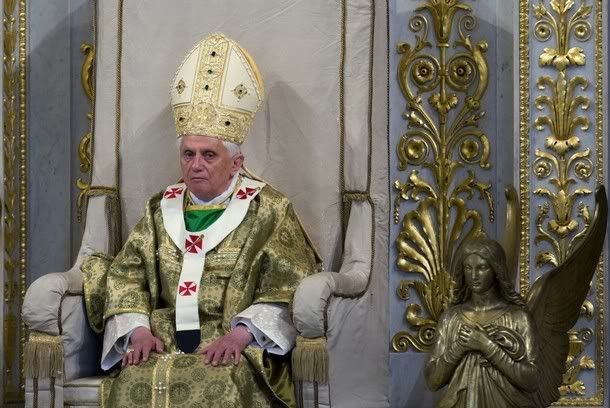
In effect, if announcing the Gospel constitutes its reason for being and its mission, it is indispensable that the Church itself knows and lives what it announces, so that its preaching may be credible, notwithstanding the weaknesses and poverty of the men who compose it.
We know, moreover, that the announcement of the Word, in the school of Christ, has the Kingdom of God as its content (cfr Mk 1,14-15), but the Kingdom of God is the person of Jesus himself, who with his words and his works, offers salvation to men in every age. In this respect, St. Jerome had an interesting consideration: "He who does not know Scriptures does not know the power of God nor his wisdom. Not to know Scriptures means not to know Christ" (Prologue to the commentary on the prophet Isaiah: PL 24,17).
In this Pauline Year, we will hear the cry of the Apostle of the Gentiles resound with particular urgency: "Woe unto me if I do not preach the Gospel" (1 Cor 9,16) - a cry which, for every Christian, becomes an insistent invitation to place oneself at the service of Christ. "The harvest is abundant" (Mt 9,37), the Divine Master repeats even today. Many have not yet met him, and are awaiting the first announcement of his Gospel. Others, though having received a Christian formation, have been weakened in their enthusiasm and have only a superficial contact with the Word of God. Still others have distanced themselves from the practice of the faith and need a new evangelization.
Then there is no lack of right-thinking persons who have essential questions on the sense of life and death, questions to which only Christ can provide satisfying answers. Thus it becomes indispensable for Christians in every continent to be ready to answer whoever asks them the reason for the hope that they have in them (cfr 1 Pt 3,15), announcing with joy the Word of God and living the Gospel without compromises.
Venerated and dear brothers, May the Lord help you to ask each other, during the next few weeks of synodal work, how to make the announcement of the Gospel more effective in our time. We are all aware how necessary to is to place the Word of God in the center of our life, to welcome Christ as our only Redeemer, as the Kingdom of God in person, to work so that his light may illumine every aspect of mankind: from the family to the school, to culture, work, free time and other spheres of society and life.
Participating in the Eucharistic celebration, we are always aware of the close link which exists between announcing the Word of God and the Eucharistic Sacrifice: it is the same Mystery which is offered for our contemplation. That is why the Church - as the Second Vatican Council expressed it - has always venerated Divine Scriptures as it has venerated the Body of the Lord itself, never failing, especially in sacred liturgy, to nourish itself with the bread of life from the table both of God's word and of Christ's body, and to offer these to the faithful.
The Council rightly concluded: "Just as the life of the Church is strengthened through more frequent celebration of the Eucharistic mystery, similarly we may hope for a new stimulus for the life of the Spirit from a growing reverence for the word of God, which 'lasts forever'(Is. 40:8; see 1 Peter 1:23-25)" [Dei Verbum 21.26). May the Lord grant that we approach with faith the double table of the Word, and the Body and Blood of Christ. May this gift be obtained for us by the Most Blessed Mary who "kept all these things, reflecting on them in her heart" (Lk 2,19). May she teach us to listen to Scriptures and to meditate on it in an interior process of maturation that never separates the mind from the heart.
May the saints come to our aid, particularly the Apostle Paul, who during this year we shall increasingly get to know as the intrepid witness and herald of the Word of God. Amen.















No comments:
Post a Comment